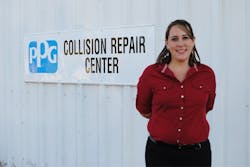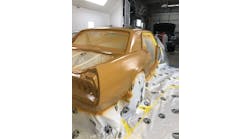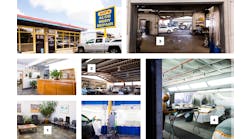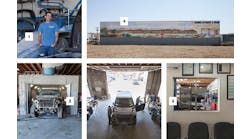Looking over estimates at her desk one recent afternoon, Leslie Oliver, manager of Dean Arbour Chevrolet Cadillac in East Tawas, Mich., had to admit the truth: Her mind was elsewhere. One of her two young sons was sick.
“On days like today, it is really a challenge to know that one of my children is sick and needs to go to the doctor,” she says. ”But the shop is terribly busy.” It’s the classic struggle to maintain a work-life balance, unfolding in real time. “I feel that I should be at home with them, but yet I am still at work,” she says. “In the back of my mind, I’m thinking. ‘Am I doing the right thing?’”
Today, family still vies for her attention, but it’s increasingly common for her to feel pressure in the other direction. The 5,500-square-foot shop does brisk business for such a small town (the population is less than 30,000), pulling in approximately $1.2 million a year servicing 100 repair orders a month. It’s a big job, and there are times she wishes she had more time to devote to her career.
“It is very easy to get caught up in work mode, see all the things that need to be done,” she says. Though the scale occasionally tips in one direction or the other, on the whole, Oliver has learned to straddle her role as body shop manager with wife and mother of two. She’s done it by separating home and work, setting personal goals, keeping employee retention high and sometimes allowing outside life to seep into the workplace.
A shop with a storied history
Dean Arbour, the owner of the shop and adjacent dealership, opened his first dealership in 1970, and has since expanded to five locations in northern Michigan offering Ford, Lincoln, Mercury, Chevrolet and Cadillac vehicles. Two of these dealerships have on-site collision repair shops. Oliver was 19 when she met Arbour; she was working as a golf caddy at a country club where he was a member. Arbour hired her as an assistant, and she learned the business over the course of five years, building her knowledge of estimates, industry technology, and customer care. When the shop’s manager announced his retirement, Oliver was tapped to take his place.
The 20-stall collision center now has five full-time employees in addition to Oliver—an assistant, one painter, one paint helper and two technicians, both of whom have ATEG and I-CAR training. A large portion of their workload comes from direct repair programs, and due to the town’s rural location and large deer population, there’s no shortage of collision repair work.
As Oliver has tackled new challenges at the shop, her commitments at home have tripled. She married her husband, Gus, and in 2007, and had a son, Hunter. Just 13 months later, she had a second son, Andrew. So how has she managed to juggle home life with the demands of the job?
Separating duties
The key to keeping everything in balance for Oliver is committing fully to the task at hand. Oliver says that when she’s at the shop, she tries to be completely focused on the business at hand, keeping family in a separate part of her mind. Once she steps out the door, though, her focus changes. “I know that I have a whole other job when I get out of the parking lot,” she says.
—Leslie Oliver, collision center manager, Dean Arbour Chevrolet cadillac
When she took over the role of manager in 2004, Oliver quickly determined that the shop needed some changes to bring it in line with today’s more customer-oriented philosophies. ”It seems that with the advancing auto industry vehicle change, repair techniques have changed, but people do not change,” she says. “I do feel that a large portion of my job is to 'fix' people—make them feel comfortable, assure them they are not as dumb as they may feel for wrecking their vehicle,” she says, smiling.
“When I started this job, it was apparent we needed to get more business. At the time things were kind of slow,” she says. One way she went about that was by beefing up customer contact (“the follow-up had not been done before”). Now, she calls vehicle owners at least every other day to update them on their vehicle’s status, and often emails photos of the work in progress. “As long as people understand what we’re doing, they seem a little more patient about turnaround times,” she says. “Before, people would drop off their car and a week later they’d call to say, ‘Hey, what’s going on with my car?’”
Personal financial goals
Though Oliver is sometimes tempted to envision a life where she has more time with her family, she says that, financially, that’s just not an option. She likes to remind herself of the advantages her salary gives her family. “If I want to plan a vacation or pay off some credit cards or get new furniture, I know I have to set goals for myself in my head,” she says. “Just by not spending all that time at home—by having a work life—I know I’ll achieve those things.”
Prioritizing employee retention
Keeping employees happy also helps the shop to run smoothly—and cuts down on the number of hours Oliver needs to be in the office. She relies on productivity-based pay as a motivator. “The technicians here are paid flat rates,” she says. “They get paid for the hours that they produce, so if they are able to get more jobs through the shop, obviously that’ll increase their pay. If they have a job that has 30 hours of repair time on the work order and it takes them 15 hours to get the job done—and get the job done correctly—then they’ll get paid the 30 hours,” she explains.
She also tries to be accommodating whenever possible. “The owners of the dealership are extremely family-oriented and they have children,” she says. “So as long as there’s nothing seriously hanging over their head, employees are allowed to come and go if they’ve got a game or a recital going on.”
Never A Bad Day
As a woman working in a predominantly male industry, Oliver faces additional challenges, but says they only drive her to succeed. “For me, it wasn’t that big of a deal, but other people make comments,” she says. “‘A girl running a body shop? That doesn’t seem right.’ Or, ‘Girl, do you really know what you’re doing?’ But you know, I just do my job and everything just falls in line after that. A lot of people are open-minded about it these days, but you definitely get a few who are critics. But that’s fine, that’s part of life.”
Bonnie Pierson, service manager for the dealership’s service department, has watched Oliver juggle her dueling roles for more than a decade, and says she’s impressed with the way Oliver manages to keep all of her plates spinning. “In all these years, I’ve never seen Leslie have a bad day,” she says. “She’s always smiling.” She credits Oliver’s managerial style and positive attitude for the shop’s increased revenue and high retention rate. “She’s a great manager,” Pierson says. “She doesn’t baby her employees—she expects great work from her guys—and her body and paint men respect her for that. More than 90 percent of them have stayed with her—it’s like a little family over there.”
And perhaps that’s the real secret. When your workplace serves as your second family, no one’s waiting anxiously to punch the clock.




